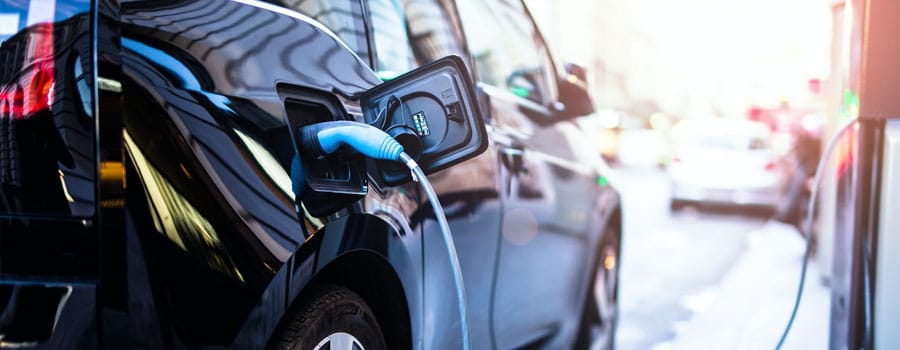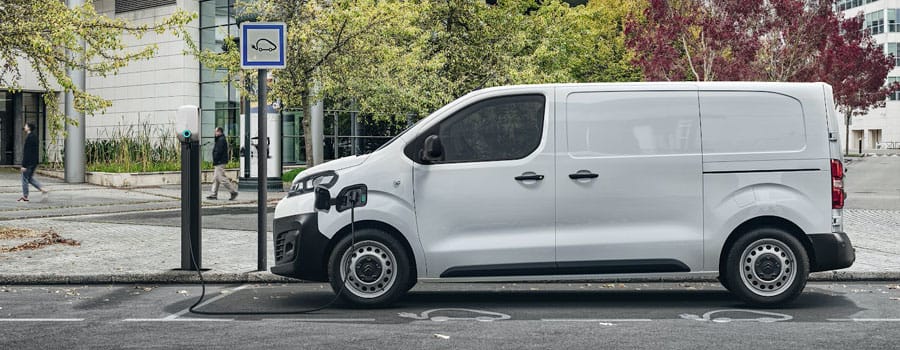Decarbonising transport - and what it means to your business

You probably noticed, somewhere between the Euro 2020 finals and the start of the British Grand Prix weekend, that the government launched some fairly significant papers around the decarbonisation of the country's transportation system.
It's a comprehensive piece, that's for sure, covering everything from cars to airplanes and trains to heavy goods vehicles.
But what does it mean for your business? How will decarbonisation affect you?
According to Grant Shapps, Secretary of State for Transport, it is not about stopping people doing things: it's about doing the same things differently, he says.
“We will still fly on holiday, but in more efficient aircraft, using sustainable fuel. We will still drive on improved roads, but increasingly in zero emission cars. We will still have new development, but it won't force us into high-carbon lifestyles.”
Making cars and vans greener is a key part of the publication
Decarbonising Transport, a Better, Greener Britain
, since electric vehicles will help remove 91% of current domestic transport greenhouse gas emissions, while ‘active commuting', such as cycling and walking will play a significant part in decarbonisation plans.
Helpfully, the government has also provided an outline of how both cars and light commercial vehicles will be zero emission by the government's stated aim of 2035 as part of the Decarbonising Transport piece. Called
Transitioning to zero emission cars and vans: 2035 delivery plan
, it provides the key pointers you and your fleet need to consider as the deadlines get closer.
Rob Marshall, Operations Director of Gateway2Lease, comments: “The document is really useful because it outlines the ‘hard points' of the plan, when you need to start taking action - which is now, actually - and how best to take advantage of the many useful incentives to make the transition of your fleet zero emisson.”
Making electric cars and vans more affordable
There remains some cost disparities between normal combustion cars and electric vehicles (EVs) - but the gap is steadily closing. To this point, the government says it will assist with the upfront cost of EVs, which helps lower the leasing rental, with the continuation of its Plug-in Car Grant to at least 2022/23. This is worth up to £2500 for cars costing no more than £35,000.

The Plug-in Van Grant will also continue to “at least” 2022/23 with £3000 available for light vans up to 2.5 tonnes and £6000 for heavier vans between 2.5-3.5 tonnes. To qualify, vans must be able to travel at least 60 miles in zero emission mode and have overall CO2 emissions below 50g/km CO2.
Tax incentives to move electric
The government has also committed to keeping the rates of benefit in kind taxation low to at least March 2025. While this isn't new, because we already had that framework in place, it does suggest there is a definite window of opportunity to make the most of these tax breaks: 1% BIK this tax year and then 2% until end March 2025.
It's also worth noting that Vehicle Excise Duty (VED) remains at £0 for EVs during this period.
In terms of vans, zero emission vans are rated at 0% BIK, while zero emission vans are also exempt from VED.
Infrastructure gets funding boost
One of the key issues affecting the transition of fleets to EVs is the thorny issue of charging infrastructure. It's something that the government recognises in the report with £1.3 billion set aside to accelerate the rollout of charging infrastructure on motorways, on streets, in homes and workplaces.
According to the report, as of April 2021, there were 22,790 public electric vehicle charging devices in the UK, and 4,259 of these are rapid chargers for a quicker battery ‘fill up'. While on the motorways and major A roads a driver will be no further than 25 miles from a rapid chargepoint. The government says it will continue to cooperate with private enterprises to ensure all motorway service stations can take high power feeds to provide rapid charging facilities. Indeed, this is already happening, with the purchase of the outdated and poorly maintained motorway service station supplier Ecotricity Electric Highway by
Gridserve in June
.
Since that acquisition, Gridserve has moved swiftly: it has replaced chargers in over 70 locations with new technology, contactless payment, reliable charging and 24×7 customer support, so the infrastructure is changing at some pace.
Meanwhile grants for workplace charging will continue until at least 2024/25 with the funding opened up to SME firms; there is also a similar commitment to grants for home chargers.
“The ambitious timescales involved in the phase-outs for the sale of polluting cars and vans leave little room for transition slip-ups,” says Rob Marshall, Operations Director at
Gateway2Lease
.
“However, the government's desire to deliver its zero emissions targets is backed up by plug-in vehicle grants and generous tax breaks. We already know that there is a limit to how long these will last which has been confirmed in its latest publication. They may be extended, of course, but this cannot be relied upon.
“So there is a distinct window of opportunity for businesses to take advantage of this electric transition assistance. Small businesses and SME fleets should take the opportunity to begin the transition to zero emissions vehicles now by taking advantage of those funds and tax breaks while they are still available. Gateway2Lease offers a comprehensive range of electric cars and vans plus expert advice to help companies begin that transition.”
View our latest blog posts

Categories
Pages
We are a family run business based in rural Worcestershire. Our team of 38 staff are on hand to provide an exceptional service to personal and business customers.
Read More
